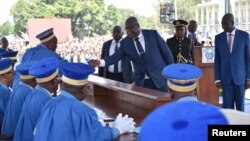The Democratic Republic of Congo's parliament held its opening session Monday after a bitterly-fought election that ushered in a new opposition president but left the National Assembly dominated by supporters of former leader Joseph Kabila.
The session opened just four days after Felix Tshisekedi was sworn in as president of sub-Saharan Africa's largest country, replacing Kabila who had ruled the country since 2001.
The handover marked the country's first-ever peaceful transfer of power since independence from Belgium in 1960, although it was disputed by runner-up Martin Fayulu, also an opposition candidate, who branded the outcome as rigged.
But the new president will have to share power with Kabila's supporters who will control parliament for the next five years after winning an overwhelming majority in the 500-seat National Assembly.
And with Kabila widely expected to wield influence through his supporters, it was expected they would feature prominently as Tshisekedi moves to choose a new prime minister and government.
Legislative elections, which took place on December 30 alongside the presidential poll, saw the pro-Kabila Joint Front for Congo (FCC) winning 337 mandates, while Lamuka, the opposition coalition which backed Fayulu, won 102 seats.
And Tshisekedi's Heading for Change bloc won just 46 mandates, just under 10 percent of the seats in the lower house.
"Tshisekedi will have little margin for maneuver," Stephanie Wolters at South Africa's Institute for Security Studies (ISS) think tank told AFP last week.
Of the 485 deputies so far elected, 50 are women.
The other 15 seats will remain vacant until March when elections can be held in three regions where they were suspended for health and security reasons.
Addressing the 434 lawmakers present at Monday's session, Jean Nguvulu Khoji, the National Assembly's administrative secretary general, urged them "not to sacrifice the interests of their constituents in favour of political interests."
At the session, Khoji began moves to establish a provisional government. A permanent lineup will only be possible in March after the outstanding elections are held and the Constitutional Court publishes the final results.
December's presidential election was challenged in court by Fayulu who branded the outcome as an "electoral coup" masterminded by Kabila with the full agreement of Tshisekedi.
He claimed he won the vote outright with more than 60 percent in a stance that initially won international support but was rejected outright by the Constitutional Court.
